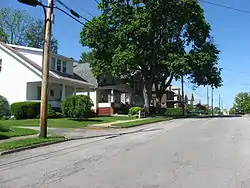North Hill Historic District (New Castle, Pennsylvania)
The North Hill Historic District is a residential neighborhood in the city of New Castle, Pennsylvania, that was entered into the National Register of Historic Places in 1999.[2] The 91-block district consists of roughly 450 acres (1.8 km2) of land that sit slightly north of New Castle's business district.[2] The area is historic due to the many ornate homes and mansions—many dating back to the 19th century—that lie within its boundaries.[3]
North Hill Historic District | |
 Fairmont Avenue, North Hill Historic District | |
 | |
| Location | New Castle, Pennsylvania |
|---|---|
| Coordinates | 41°0′48″N 80°20′37″W |
| Area | 449.7 acres (182 ha) |
| Architectural style | 19th and 20th Century, Late Victorian, 19th Century Revival |
| NRHP reference No. | 00000056[1] |
| Added to NRHP | February 18, 2000 |
Architecture
The district includes a variety of architectural styles. Its 1,888[2] buildings include Late 19th and Early 20th Century, Late Victorian, and Late 19th and 20th Century Revivals.[2] One such residence was built in 1895 for Mathias Holstein Henderson, a prominent New Castle resident who at the time was vice-president of Lawrence Saving and Trust (now National City Bank).[3] The home is now maintained by the Meehan family. The Reis Home, formerly located at 318 East Street, was built for steel manufacturer William Reis.[3] The two-story Colonial Revival home remained in the Reis family until 1993 and was eventually demolished to make room for the new New Castle High School.[3] In addition to these and other historic buildings, a concrete girder bridge on Boyles avenue was reportedly built by the Works Progress Administration (WPA).[4] Also located in the district is the Scottish Rite Cathedral.
Most of the homes in the district are built of either masonry or wood and contain multiple floors.[2] Though the district consists primarily of single and multiple dwellings, there exists a very small percentage of commercial and health care properties. Four schools and four religious buildings also reside within the district.[2] The sidewalk patterns have remained unchanged since at least 1904. Queen Anne, Folk Victorian, Neoclassical, and Colonial Revival are the most common design styles of homes overlooking the downtown area.[2]
Notable Contributing Structures
- Greer Residence (1904-05), 408 North Jefferson Street (now Lawrence County Historical Society )
- Hoyt Residences (now Arts + Education at the Hoyt )
- Henderson Residence (1895) (now Meehan Funeral Home [5])
- Ohl Residence
- Scottish Rite Cathedral
- Trinity Episcopal Church
- Clen-Moore Presbyterian Church (1929), 220 Clen-Moore Boulevard
- George Washington Intermediate School (1928), 101 East Euclid Avenue
- Garfield Terrace (1897), 417-421 East Garfield Avenue
- Bower Residence (1886-1889), 328 Highland Avenue
- Johnson Residence (1901), 318 Highland Avenue (now Signature Hill )
- Reis/Brown Residence (c. 1885), 312 Highland Avenue[6] (now Highland House, Inc. )
Significance
With urban residential growth in the historic district beginning in 1870 and ending in 1949, the National Register's 50-year guideline for significance is met.[2] The district is significant under National Register Criterion C for architecture, and Criterion A for industry; the neighborhood is where executives of local industries (steel, tin, and iron) lived.[2]
News Coverage
- Lugene Pezzuto, "Review board against razing Speedway properties", December 7, 2016, https://www.ncnewsonline.com/news/review-board-against-razing-speedway-properties/article_03b32f9e-bc22-11e6-83f1-3bd375185747.html.
- Susan Linville, PhD, "1950s saw tide of downtown demolition start to roll", May 27, 2017, https://www.ncnewsonline.com/news/susan-linville-s-saw-tide-of-downtown-demolition-start-to/article_f5a26090-4269-11e7-81d4-3f4d73ddf854.html.
- Susan Linville, PhD, "Urban renewal fervor strikes in 1960s", May 29, 2017, https://www.ncnewsonline.com/news/susan-linville-urban-renewal-fervor-strikes-in-s/article_b858067a-43dd-11e7-b9f5-b35784f3e918.html.
- Susan Linville, PhD, "In the 1970s, the bubble burst", May 30, 2017, https://www.ncnewsonline.com/news/susan-linville-in-the-s-the-bubble-bursts/article_8701ada0-44bf-11e7-b539-b79b886b6a1e.html.
- Susan Linville, PhD, "In the 1990s, preservation interest flares, then falters", May 31, 2017, https://www.ncnewsonline.com/news/susan-linville-in-the-preservation-interest-flares-then-falters/article_a221e95a-4579-11e7-88dd-db47cafcb36a.html.
- Nancy Lowery, "HARB seeking new role in city", June 6, 2017, https://www.ncnewsonline.com/news/local_news/harb-seeking-new-role-in-city/article_68ca7151-112c-577a-9ab1-7d552d200959.html.
- Nancy Lowery, "Planners favor historic district", June 9, 2017, https://www.ncnewsonline.com/news/local_news/planners-favor-city-historic-district/article_213fcbd0-79fc-5288-a4e0-36966d74e6f1.html.
References
- "NPS Focus". National Register of Historic Places. National Park Service. Retrieved August 1, 2010.
- Living Places
- Lawrence County Historical Society
- George, Thomas J (October 7, 1999). "North Hill Historic District" (PDF). National Register of Historic Places Registration Form. Pennsylvania Historical and Museum Commission. Retrieved August 2, 2010.
- "Meehan mansion". New Castle News. November 25, 2015. Retrieved September 12, 2019.
- "Facebook". www.facebook.com. Retrieved 2019-09-12.

